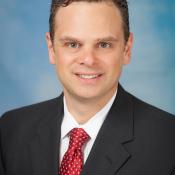Epilepsy affects an estimated 65 million people worldwide, according to the National Institutes of Health. An estimated 1 in 26 people in the United States will develop epilepsy in their lifetime.
David Anschel, MD, Director of Clinical Neurophysiology & Epilepsy at Catholic Health’s St. Charles Hospital, shares important information about epilepsy and how you will find the highest level of care at Catholic Health.
What is Epilepsy?
Epilepsy is a brain disorder characterized by recurrent non-provoked seizures. Epilepsy disrupts the normal electrical activity in your brain. Abnormal synchronized brain waves send the wrong signals resulting in seizures.
Convulsions are a type of seizure. But they don’t always cause stiffening of your limbs and uncontrolled shaking. Many have subtle, and more difficult to recognize symptoms, such as staring spells, periods of confusion, or an abnormal sensation.
Types of Seizures and Symptoms
Seizures typically last 30 seconds to two minutes and don’t usually cause permanent damage to your health. Seizures that last five minutes or longer can be a medical emergency and require immediate medical attention.
There are two main categories of seizures:
- Focal or partial seizures are linked to a specific area of your brain.
- Generalized seizures affect your whole brain.
Within those two categories are many types of seizures. Each has its own symptoms. The most common seizures include:
- Absence seizures affect your whole brain. In the past they were called petit mal seizures. They usually last only a few seconds and cause staring spells, loss of awareness and small, uncontrolled muscle movements.
- Focal or partial seizures affect only one part of your brain. The symptoms vary depending on the area of your brain from which the seizures originate. They may include emotional changes, hallucinations, tingling, an altered sense of smell, taste, hearing or touch.
- Tonic-clonic seizures affect widespread areas of your brain. Tonic-clonic seizures cause rigid, stiff muscles and uncontrolled shaking called convulsions. You may clench your jaw, bite your tongue or cheeks and lose bladder control. Most people lose consciousness during this type of seizure.
Causes of Epilepsy
It's not always possible to determine why you have epilepsy. Anyone can develop the disorder, but it occurs most frequently in older adults and younger children.
Risk factors include:
- Family history of epilepsy
- Head injury or trauma
- Health issues that are present at birth
- Infections such as encephalitis, meningitis and AIDS
- Medical conditions, including stroke, brain tumor or Alzheimer’s disease
Treating Epilepsy
The most effective treatment plans for epilepsy are personalized according to your unique health needs, your symptoms and how you respond to therapy.
Treatment options include:
- Anticonvulsant medication reduces or eliminates seizures. It is the most common form of epilepsy treatment.
- A vagus nerve stimulator is a device surgically placed in your chest that stimulates a nerve in your neck to prevent seizures.
- Surgery to remove or alter the area of your brain causing seizures. In some cases, electrodes are implanted into your head to help control the electrical impulses.
Through treatment, most people with epilepsy can keep their seizures under control and live healthy, productive and fulfilling lives.
Find Care at Catholic Health
St. Charles Epilepsy (Port Jefferson, NY) is a National Association of Epilepsy (NAEC) level 3 epilepsy center; and an affiliate of the level 4 accredited New York University Comprehensive Epilepsy Center. This means our team of specialists has the expertise and technology to offer the most advanced neurological testing, diagnosis and treatment of epilepsy and other seizure disorders.
We understand the impact epilepsy has on your life. We use a team approach with specially trained physicians, nurses, psychologists, social workers and administrators all working together to provide the care you need. Inpatient and outpatient services are both available.
We offer:
- Advanced evaluation and diagnosis
- Extensive medical, neuropsychological and psychosocial treatment
- Intensive neurodiagnostic monitoring
- Leading-edge testing and imaging techniques
- Surgical treatment options
Call (866) MY-LI-DOC (866-695-4362) to find a Catholic Health physician near you. Talk to your physician about a referral to St. Charles Epilepsy. Call 631-474-6279 to schedule an appointment.


